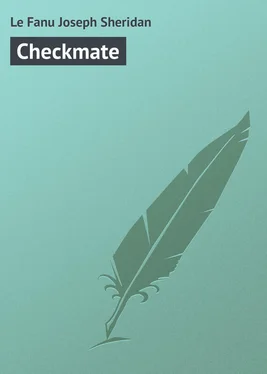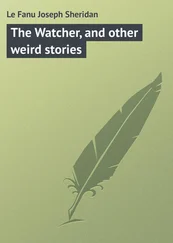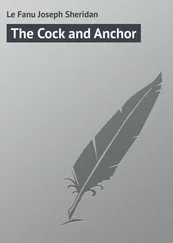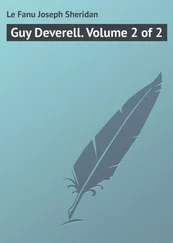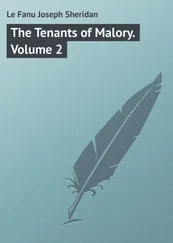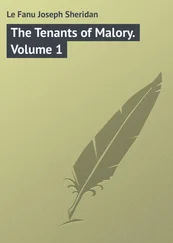Joseph Le Fanu - Checkmate
Здесь есть возможность читать онлайн «Joseph Le Fanu - Checkmate» — ознакомительный отрывок электронной книги совершенно бесплатно, а после прочтения отрывка купить полную версию. В некоторых случаях можно слушать аудио, скачать через торрент в формате fb2 и присутствует краткое содержание. Жанр: foreign_prose, на английском языке. Описание произведения, (предисловие) а так же отзывы посетителей доступны на портале библиотеки ЛибКат.
- Название:Checkmate
- Автор:
- Жанр:
- Год:неизвестен
- ISBN:нет данных
- Рейтинг книги:5 / 5. Голосов: 1
-
Избранное:Добавить в избранное
- Отзывы:
-
Ваша оценка:
- 100
- 1
- 2
- 3
- 4
- 5
Checkmate: краткое содержание, описание и аннотация
Предлагаем к чтению аннотацию, описание, краткое содержание или предисловие (зависит от того, что написал сам автор книги «Checkmate»). Если вы не нашли необходимую информацию о книге — напишите в комментариях, мы постараемся отыскать её.
Checkmate — читать онлайн ознакомительный отрывок
Ниже представлен текст книги, разбитый по страницам. Система сохранения места последней прочитанной страницы, позволяет с удобством читать онлайн бесплатно книгу «Checkmate», без необходимости каждый раз заново искать на чём Вы остановились. Поставьте закладку, и сможете в любой момент перейти на страницу, на которой закончили чтение.
Интервал:
Закладка:
Mr. Longcluse shut his dressing-room door sharply; he walked to the window, and looked out with a vicious scowl; he turned about, and lifted up his clenched hand, and stamped on the floor. A sudden thought now struck him.
“The right foot? By Jove! it may not be the one.”
The boot that was left was already in his hand. He was examining it curiously.
“Ay, by heaven! The right was the boot! What's the meaning of this? Conspiracy? I should not wonder.”
He examined it carefully again, and flung it into its corner with violence.
“If it's an accident, it is a very odd one. It is a suspicious accident. It may be, of course, all right. I daresay it is all right. The odds are ten, twenty, a thousand to one that Armagnac has got it. I should have had a warm bath last night, and taken a ten miles' ride into the country this morning. It must be all right, and I am plaguing myself without a cause.”
Yet he took up the boot, and examined it once more; then, dropping it, went to the window and looked into the street – came back, opened his door, and listened for the messenger's return.
It was not long deferred. As he heard them approach, Mr. Longcluse flung open his door and confronted them, in white waistcoat and shirt-sleeves, and with a very white and stern face – face and figure all white.
“Well, what about it? Where's the boot?” he demanded, sharply.
“The boy inquired, Sir,” said Mr. Franklin, indicating the messenger with his open hand, and undertaking the office of spokesman; “and Mr. Armagnac did not send for the boot, Sir, and has not got it.”
“Oh, oh! very good. And now, Sir,” he said, in rising fury, turning upon Charles, “what have you got to say for yourself?”
“The man said he came from Mr. Armagnac, please, Sir,” said Charles, “and wanted the boot, which Mr. Franklin should have back as early as he could return it.”
“Then you gave it to a common thief with that cock-and-a-bull story, and you wish me to believe that you took it all for gospel. There are men who would pitch you over the bannisters for a less thing. If I could be certain of it, I'd put you beside him in the dock. But, by heavens! I'll come to the bottom of the whole thing yet.”
He shut the door with a crash, in the faces of the three men, who stood on the lobby.
Mr. Franklin was a little puzzled at these transports, all about a boot. The servants looked at one another without a word. But just as they were going down, the dressing-room door opened, and the following dialogue ensued: —
“See, Charles, it was you who saw and spoke with that man?” said Longcluse.
“Yes, Sir.”
“Should you know him again?”
“Yes, Sir, I think I should.”
“What kind of man was he?”
“A very common person, Sir.”
“Was he tall or short? What sort of figure?”
“Tall, Sir.”
“Go on; what more? Describe him.”
“Tall, Sir, with a long neck, and held himself straight; very flat feet, I noticed; a thin man, broad in the shoulders – pretty well that.”
“Describe his face,” said Longcluse.
“Nothing very particular, Sir; a shabby sort of face – a bad colour.”
“How?”
“A bad white, Sir, and pock-marked something; a broad face and flat, and a very little bit of a nose; his eyes almost shut, and a sort of smile about his mouth, and stingy bits of red whiskers, in a curl, down each cheek.”
“How old?”
“He might be nigh fifty, Sir.”
“Ha, ha! very good. How was he dressed?”
“Black frock coat, Sir, a good deal worn; an old flowered satin waistcoat, worn and dirty, Sir; and a pair of raither dirty tweed trousers. Nothing fitted him, and his hat was brown and greasy, begging your parding, Sir; and he had a stick in his hand, and cotton gloves – a-trying to look genteel.”
“And he asked for the right boot?” asked Mr. Longcluse.
“Yes, Sir.”
“You are quite sure of that? Did he take the boot without looking at it, or did he examine it before he took it away?”
“He looked at it sharp enough, Sir, and turned up the sole, and he said ‘It's all right,’ and he went away, taking it along with him.”
“He asked for the boot I wore yesterday, or last night – which did he say?” asked Mr. Longcluse.
“I think it was last night he said, Sir,” answered Charles.
“Try to recollect yourself. Can't you be certain? Which was it?”
“I think it was last night , Sir, he said.”
“It doesn't signify,” said Mr. Longcluse; “I wanted to see that your memory was pretty clear on the subject. You seem to remember all that passed pretty accurately.”
“I recollect it perfectly well, Sir.”
“H'm! That will do. Franklin, you'll remember that description – let every one of you remember it. It is the description of a thief; and when you see that fellow again, hold him fast till you put him in the hands of a policeman. And, Charles, you must be prepared, d'ye see, to swear to that description; for I am going to the detective office, and I shall give it to the police.”
“Yes, Sir,” answered Charles.
“I sha'n't want you, Franklin; let some one call a cab.”
So he returned to his dressing-room, and shut the door, and thought – “That's the fellow whom that miserable little fool, Lebas, pointed out to me at the saloon last night. He watched him, he said, wherever he went. I saw him. There may be other circumstances. That is the fellow – that is the very man. Here's matter to think over! By heaven! that fellow must be denounced, and discovered, and brought to justice. It is a strong case – a pretty hanging case against him. We shall see.”
Full of surmises about his lost boot, Atra Cura walking unheard behind him, with her cold hand on his shoulder, and with the image of the ex-detective always gliding before or beside him, and peering with an odious familiarity over his shoulder into his face, Mr. Longcluse marched eastward with a firm tread and a cheerful countenance. Friends who nodded to him, as he walked along Piccadilly, down Saint James's Street, and by Pall Mall, citywards, thought he had just been listening to an amusing story. Others, who, more deferentially, saluted the great man as he walked lightly by Temple Bar, towards Ludgate Hill, for a moment perplexed themselves with the thought, “What stock is up, and what down, on a sudden, to-day, that Longcluse looks so radiant?”
CHAPTER IX
THE MAN WITHOUT A NAME
Mr. Longcluse had made up his mind to a certain course – a sharp and bold one. At the police office he made inquiry. “He understood a man had been lately dismissed from the force, answering to a certain description, which he gave them; and he wished to know whether he was rightly informed, because a theft had been that morning committed at his house by a man whose appearance corresponded, and against whom he hoped to have sufficient evidence.”
“Yes, a man like that had been dismissed from the detective department within the last fortnight.”
“What was his name?” Mr. Longcluse asked.
“Paul Davies, Sir.”
“If it should turn out to be the same, I may have a more serious charge to bring against him,” said Mr. Longcluse.
“Do you wish to go before his worship, and give an information, Sir?” urged the officer, invitingly.
“Not quite ripe for that yet,” said Mr. Longcluse, “but it is likely very soon.”
“And what might be the nature of the more serious charge, Sir?” inquired the officer, insinuatingly.
“I mean to give my evidence at the coroner's inquest that will be held to-day, on the Frenchman who was murdered last night at the Saloon Tavern. It is not conclusive – it does not fix anything upon him; it is merely inferential.”
Читать дальшеИнтервал:
Закладка:
Похожие книги на «Checkmate»
Представляем Вашему вниманию похожие книги на «Checkmate» списком для выбора. Мы отобрали схожую по названию и смыслу литературу в надежде предоставить читателям больше вариантов отыскать новые, интересные, ещё непрочитанные произведения.
Обсуждение, отзывы о книге «Checkmate» и просто собственные мнения читателей. Оставьте ваши комментарии, напишите, что Вы думаете о произведении, его смысле или главных героях. Укажите что конкретно понравилось, а что нет, и почему Вы так считаете.
